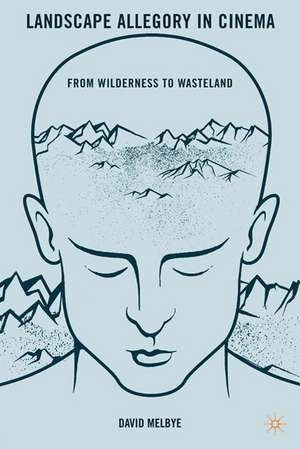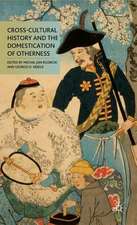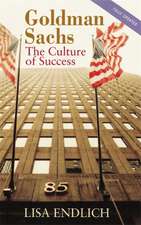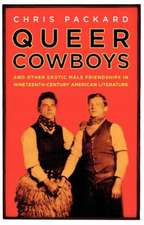Landscape Allegory in Cinema: From Wilderness to Wasteland
Autor D. Melbyeen Limba Engleză Hardback – 18 aug 2010
| Toate formatele și edițiile | Preț | Express |
|---|---|---|
| Paperback (1) | 381.43 lei 6-8 săpt. | |
| Palgrave Macmillan US – 14 noi 2015 | 381.43 lei 6-8 săpt. | |
| Hardback (1) | 384.86 lei 6-8 săpt. | |
| Palgrave Macmillan US – 18 aug 2010 | 384.86 lei 6-8 săpt. |
Preț: 384.86 lei
Nou
Puncte Express: 577
Preț estimativ în valută:
73.65€ • 79.97$ • 61.87£
73.65€ • 79.97$ • 61.87£
Carte tipărită la comandă
Livrare economică 22 aprilie-06 mai
Preluare comenzi: 021 569.72.76
Specificații
ISBN-13: 9780230104075
ISBN-10: 023010407X
Pagini: 207
Ilustrații: XII, 207 p. 10 illus.
Dimensiuni: 140 x 216 x 15 mm
Greutate: 0.34 kg
Ediția:2010
Editura: Palgrave Macmillan US
Colecția Palgrave Macmillan
Locul publicării:New York, United States
ISBN-10: 023010407X
Pagini: 207
Ilustrații: XII, 207 p. 10 illus.
Dimensiuni: 140 x 216 x 15 mm
Greutate: 0.34 kg
Ediția:2010
Editura: Palgrave Macmillan US
Colecția Palgrave Macmillan
Locul publicării:New York, United States
Cuprins
Introduction: Defining Landscape Allegory Landscape Portrayal Before Cinema Spiritualized Landscapes of the Nineteenth Century The Advent of Filming Allegorical Landscape Avant-Garde Film Depiction of Landscape in the 1960s Spiritual Wasteland Films of the 1960s and 70s Australian Outback Allegories of Cultural Exploitation Hollywood's Imperialist Allegories Imperialist River/Jungle Allegories and Beyond Conclusion
Recenzii
"Melbye's Landscape Allegory in Cinema addresses a significant gap in film studies by focusing on the role that landscape plays in film from silents through the '70's. By examining the role of landscape in painting, photography and literature, as well as film, Melbye has made the case for the symbolic role of landscape in twentieth-century cinema." - Robert Folkenflik, Edward A. Dickson Emeritus Professor of English, University of California, Irvine
"In his autobiography, Kurosawa Akira, claimed that in his classic Rashomon he had used the forest wilderness around Nara to figure 'people going astray in the thickets of their hearts.' Such an allegorical use of landscape has regularly fascinated film semioticians, but David Melbye is the first to provide a systematic overview of the topic. His succinct but penetrating survey of the use of landscape in classical literature and in European and US painting demonstrates how representations of the natural world could be simultaneously realistic and idealized. In this, they provide the basis for cinema's use of landscape as itself a protagonist in narrative, rather than merely its context. Melbye's analysis continues though early forms of cinema, but arrives at its main concerns in films of social critique, especially in the 1960s and 1970s, both avant-garde and industrial. Ranging from Bosch to Brakhage, from Ovid's Metamorphoses to Lawrence of Arabia and Vanishing Point, his ambitious and persuasive study is sure to beattractive to film scholars and popular audiences alike." - David E. James, Professor of Critical Studies, School of Cinematic Arts, University of Southern California
"In his autobiography, Kurosawa Akira, claimed that in his classic Rashomon he had used the forest wilderness around Nara to figure 'people going astray in the thickets of their hearts.' Such an allegorical use of landscape has regularly fascinated film semioticians, but David Melbye is the first to provide a systematic overview of the topic. His succinct but penetrating survey of the use of landscape in classical literature and in European and US painting demonstrates how representations of the natural world could be simultaneously realistic and idealized. In this, they provide the basis for cinema's use of landscape as itself a protagonist in narrative, rather than merely its context. Melbye's analysis continues though early forms of cinema, but arrives at its main concerns in films of social critique, especially in the 1960s and 1970s, both avant-garde and industrial. Ranging from Bosch to Brakhage, from Ovid's Metamorphoses to Lawrence of Arabia and Vanishing Point, his ambitious and persuasive study is sure to beattractive to film scholars and popular audiences alike." - David E. James, Professor of Critical Studies, School of Cinematic Arts, University of Southern California
Notă biografică
DAVID MELBYE is Lecturer in the Department of Media and Cultural Studies at University of California, USA.










